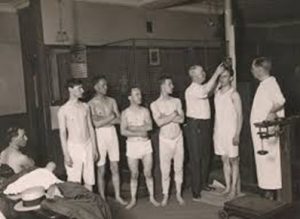25 Draft Board
Draft board and the war in Viet Nam
When I came back to the States after my Peace Corps Brazilian tour in 1966, the USA was in turmoil about this crazy Viet Nam War in which we had become embroiled. While serving in Mato Grosso, Brazil, I had heard a bit about the war and had read the opinions presented in month-old Time Magazines that promoted and justified the American involvement. I had been influenced by what I had read and was mildly in favor of the war. Upon my return, I immediately enrolled at the University of Colorado in Boulder where I planned to complete my undergraduate degree. It was not long before my opinion about the war changed and now, I could not see much sense to the war, as I could see how Americans easily judge foreign cultures as being negative and antagonistic. Our U.S. bias about communism was all-consuming and the military draft was busily building an army of soldiers who were not in agreement with this mission. A year later the draft board reclassified me as 1A, the status of being “ready to be drafted.”

Sample “Draft Classification Card: 1970” by Washington Area Spark is licensed under CC BY-NC 2.0. I-A meant that the person could be called to enlist in the army at any moment.
I asked the people at the draft board if I could finish my newly determined Geography degree before I would have to go serve. Their response to me was:
“You have spent five years since you left high school, and you have used up your window of time when you should have earned a degree. It is time to serve your country!”
“What about the Peace Corps”?
“Peace Corps, what the hell is that? This is about war!”
The two years in the Peace Corps had been a waste of time according to them. I was not sure what to do. My father suggested that I join the Reserve Officer Training Corps (ROTC) on campus which would allow me to complete my degree before serving in the military as an officer. Hesitantly, I went over to the ROTC on campus to see if I could register in their program. They looked past my long hair and beard and told me to take the physical exam at a military facility in Denver where they made an appointment for me. If I passed the physical, then “we could negotiate officer training.”
Full of fear, I arrived at the facility where I was told to go into this big room and undress. There I found a room full of physically fit young men, all gung-ho to join the army. I felt quite odd with my hippy-like appearance. A doctor came in and began examining us.
 Conducting physicals for joining the army. Bahaiteachings.org
Conducting physicals for joining the army. Bahaiteachings.org
As we were milling around, he came up behind me and slapped me on my lower back where I had a couple of scars.
“What is this?” he demanded. I did not understand what he was talking about.
“That scar on your back; why do you have it?”
“I had a spinal fusion when I had left high school.” I had forgotten all about that surgery when I spent the whole summer of 1962 in a full body cast in order for it to heal. It had not been a problem getting into the Peace Corps and during those two years, I had experienced no ill effects from it.
“You will not be able to able to serve in the military with this imperfection”
“The draft board has classified me as ‘1A’”. “Will they be drafting me in spite of this?”
“They shouldn’t, but they will ask you to take another physical exam.”
A few months later the draft board called to schedule my physical at the same military facility. This time I was prepared and took with me my doctor’s statement, x-rays of my back, and documentation on my surgery. I did not want to leave any doubt about passing the physical this time. Upon arrival at the military facility, I noticed, a completely different attitude among the men receiving their physicals. This time it was a crowd of would-be “draft dodgers.” They arrived with many kinds of appearances, long hair like my own, hippy clothes, and men trying to act as if they were homosexual; anything to be rejected from the military. None of these people wanted to go into the army. I proceeded to cooperate with the physical examiners. I made sure that they saw my paperwork. They asked if I would sign a paper allowing me to join the army in spite of my imperfection and would excuse the military for any harm that might happen to my back. He handed me a paper with a line waiting for a signature.
I could not believe they would ask me this. I calmly decided not to sign such a document!

